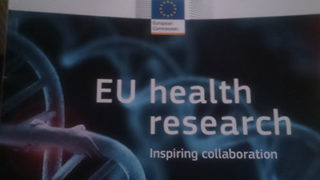On December 8, the Alliance for Maternal Health Equality had the pleasure of attending the Together for the Next Generation – Research and Innovation for Maternal and Newborn Health, organised by the European Commission’s (EC) Directorate-General for Research & Innovation.
As one of the main objectives of the Alliance is highlighting the necessity for and lack of real-life data and evidence, the conference was of major importance to us, focusing on the need for more maternal, newborn and child health research. We learned a lot during a plethora of discussions surrounding this issue and we are welcoming the introduction of the Birth Day Prize by the EC: an initiative that provides incentives for delivering a novel and safe solution against maternal morbidity, mortality and stillbirths.

The Conference also featured an exhibition called ‘Birth Day’ by Belgian photographer Lieve Blancquaert
In a Europe of states with varying standards of life and economic situations, maternal health, just like in the rest of the world, is a particular problem in the low and middle income settings. The continent was mentioned several times, including by Dr. Priya Agrawal (MSD for Mothers, a founding partner of the Alliance for Maternal Health Equality) who brought to the attention of the public some striking statistics around maternal health in Europe1 and highlighted the importance of research and innovation as a way to improve the current status quo. Of course, while making the world safer for all mothers is the broader topic everyone was focusing on, the issue in Europe seems to be around accessing the healthcare system and being properly informed and aware of your rights and responsibilities.

The focus of the conference was the role research and innovation have as a way to improve the situation around maternal and newborn health in light of the Sustainable Development Goals
In between the sessions, the Alliance also got the chance to exchange information with numerous stakeholders working in the field of maternal health, many of whom focused on the global South as a region. Our discussions together proved that cooperation is not just desirable but completely achievable – after all, the recently adopted Sustainable Development Goals and their enshrined focus on improving maternal health are universal – no country should be left out, no continent should be forgotten. The lack of statistics from areas traditionally considered as more affluent (such as Europe) was also mentioned by Ms Nkandu Luo, Minister of Gender of Zambia, who remarked during her role as moderator for the second panel that we may be ignoring a lot of women from these regions simply due to missing real numbers.
Data matters for improving the situation for all mothers, there is no doubt about it. It is no surprise that the conference was opened by Carlos Moedas, European Commissioner for Research, Science and Innovation, referring to the words of Countess Lucy Bawdwin, a major proponent of maternal health and rights, who compared childbirth to the experiences of soldiers in the trenches: each moment can be your last and you have nothing else to do but look danger in the face. Proper real-life data on maternal health must be regarded as having the same value as military intelligence at war: without it, you cannot advance and you have little chance at winning the battle for improving the lives of mothers.
––
1 If you are interested to learn more, check out the Alliance for Maternal Health Equality Infographic on maternal health statistics in Europe: https://www.maternalhealthalliance.eu/policy_action
